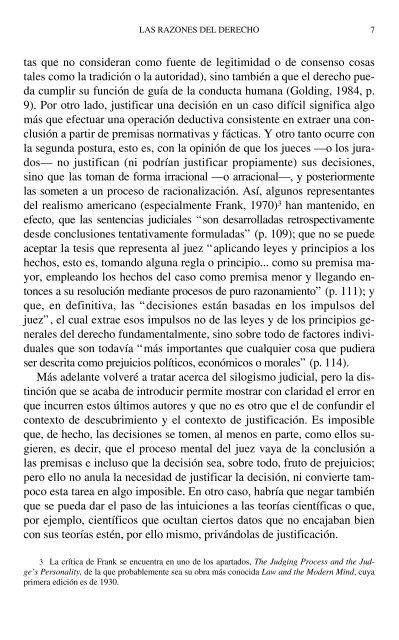LAS RAZONES DEL DERECHO Teo rías de la ar gu men ta ción ju rí di ca
Create successful ePaper yourself
Turn your PDF publications into a flip-book with our unique Google optimized e-Paper software.
<strong>LAS</strong> <strong>RAZONES</strong> <strong>DEL</strong> <strong>DERECHO</strong> 7<br />
<strong>ta</strong>s que no consi<strong>de</strong>ran como fuente <strong>de</strong> legitimidad o <strong>de</strong> consenso cosas<br />
<strong>ta</strong>les como <strong>la</strong> tra<strong>di</strong><strong>ción</strong> o <strong>la</strong> autoridad), sino <strong>ta</strong>mbién a que el <strong>de</strong>recho pueda<br />
cumplir su fun<strong>ción</strong> <strong>de</strong> <strong>gu</strong>ía <strong>de</strong> <strong>la</strong> conduc<strong>ta</strong> humana (Gol<strong>di</strong>ng, 1984, p.<br />
9). Por otro <strong>la</strong>do, <strong>ju</strong>stific<strong>ar</strong> una <strong>de</strong>cisión en un <strong>ca</strong>so <strong>di</strong>fícil signifi<strong>ca</strong> algo<br />
más que efectu<strong>ar</strong> una opera<strong>ción</strong> <strong>de</strong>ductiva consistente en extraer una conclusión<br />
a p<strong>ar</strong>tir <strong>de</strong> premisas normativas y fácti<strong>ca</strong>s. Y otro <strong>ta</strong>nto ocurre con<br />
<strong>la</strong> se<strong>gu</strong>nda postura, esto es, con <strong>la</strong> opinión <strong>de</strong> que los <strong>ju</strong>eces —o los <strong>ju</strong>rados—<br />
no <strong>ju</strong>stifi<strong>ca</strong>n (ni pod<strong>rí</strong>an <strong>ju</strong>stific<strong>ar</strong> propia<strong>men</strong>te) sus <strong>de</strong>cisiones,<br />
sino que <strong>la</strong>s toman <strong>de</strong> forma irracional —o <strong>ar</strong>racional—, y posterior<strong>men</strong>te<br />
<strong>la</strong>s someten a un proceso <strong>de</strong> racionaliza<strong>ción</strong>. Así, al<strong>gu</strong>nos represen<strong>ta</strong>ntes<br />
<strong>de</strong>l realismo ameri<strong>ca</strong>no (especial<strong>men</strong>te Frank, 1970) 3 han mantenido, en<br />
efecto, que <strong>la</strong>s sentencias <strong>ju</strong><strong>di</strong>ciales “son <strong>de</strong>s<strong>ar</strong>rol<strong>la</strong>das retrospectiva<strong>men</strong>te<br />
<strong>de</strong>s<strong>de</strong> conclusiones ten<strong>ta</strong>tiva<strong>men</strong>te formu<strong>la</strong>das” (p. 109); que no se pue<strong>de</strong><br />
acept<strong>ar</strong> <strong>la</strong> tesis que represen<strong>ta</strong> al <strong>ju</strong>ez “apli<strong>ca</strong>ndo leyes y principios a los<br />
hechos, esto es, tomando al<strong>gu</strong>na reg<strong>la</strong> o principio... como su premisa mayor,<br />
empleando los hechos <strong>de</strong>l <strong>ca</strong>so como premisa <strong>men</strong>or y llegando entonces<br />
a su resolu<strong>ción</strong> me<strong>di</strong>ante procesos <strong>de</strong> puro razonamiento” (p. 111); y<br />
que, en <strong>de</strong>finitiva, <strong>la</strong>s “ <strong>de</strong>cisiones están basadas en los impulsos <strong>de</strong>l<br />
<strong>ju</strong>ez”, el cual extrae esos impulsos no <strong>de</strong> <strong>la</strong>s leyes y <strong>de</strong> los principios generales<br />
<strong>de</strong>l <strong>de</strong>recho funda<strong>men</strong><strong>ta</strong>l<strong>men</strong>te, sino sobre todo <strong>de</strong> factores in<strong>di</strong>viduales<br />
que son todavía “más impor<strong>ta</strong>ntes que cualquier cosa que pu<strong>di</strong>era<br />
ser <strong>de</strong>scri<strong>ta</strong> como pre<strong>ju</strong>icios políticos, económicos o morales” (p. 114).<br />
Más a<strong>de</strong><strong>la</strong>nte volveré a trat<strong>ar</strong> acer<strong>ca</strong> <strong>de</strong>l silogismo <strong>ju</strong><strong>di</strong>cial, pero <strong>la</strong> <strong>di</strong>stin<strong>ción</strong><br />
que se a<strong>ca</strong>ba <strong>de</strong> introducir permite mostr<strong>ar</strong> con c<strong>la</strong>ridad el error en<br />
que incurren estos últimos autores y que no es otro que el <strong>de</strong> confun<strong>di</strong>r el<br />
contexto <strong>de</strong> <strong>de</strong>scubrimiento y el contexto <strong>de</strong> <strong>ju</strong>stifi<strong>ca</strong><strong>ción</strong>. Es imposible<br />
que, <strong>de</strong> hecho, <strong>la</strong>s <strong>de</strong>cisiones se to<strong>men</strong>, al <strong>men</strong>os en p<strong>ar</strong>te, como ellos sugieren,<br />
es <strong>de</strong>cir, que el proceso <strong>men</strong><strong>ta</strong>l <strong>de</strong>l <strong>ju</strong>ez vaya <strong>de</strong> <strong>la</strong> conclusión a<br />
<strong>la</strong>s premisas e incluso que <strong>la</strong> <strong>de</strong>cisión sea, sobre todo, fruto <strong>de</strong> pre<strong>ju</strong>icios;<br />
pero ello no anu<strong>la</strong> <strong>la</strong> necesidad <strong>de</strong> <strong>ju</strong>stific<strong>ar</strong> <strong>la</strong> <strong>de</strong>cisión, ni convierte <strong>ta</strong>mpoco<br />
es<strong>ta</strong> t<strong>ar</strong>ea en algo imposible. En otro <strong>ca</strong>so, hab<strong>rí</strong>a que neg<strong>ar</strong> <strong>ta</strong>mbién<br />
que se pueda d<strong>ar</strong> el paso <strong>de</strong> <strong>la</strong>s intuiciones a <strong>la</strong>s teo<strong><strong>rí</strong>as</strong> científi<strong>ca</strong>s o que,<br />
por ejemplo, científicos que ocul<strong>ta</strong>n ciertos datos que no en<strong>ca</strong>jaban bien<br />
con sus teo<strong><strong>rí</strong>as</strong> estén, por ello mismo, privándo<strong>la</strong>s <strong>de</strong> <strong>ju</strong>stifi<strong>ca</strong><strong>ción</strong>.<br />
3 La c<strong>rí</strong>ti<strong>ca</strong> <strong>de</strong> Frank se encuentra en uno <strong>de</strong> los ap<strong>ar</strong><strong>ta</strong>dos, The Judging Process and the Judge’s<br />
Personality, <strong>de</strong> <strong>la</strong> que probable<strong>men</strong>te sea su obra más conocida Law and the Mo<strong>de</strong>rn Mind, cuya<br />
primera e<strong>di</strong><strong>ción</strong> es <strong>de</strong> 1930.



